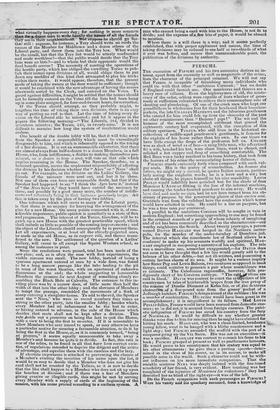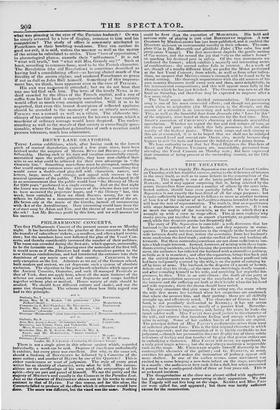FIESCHI.
Tim execution of FIF9CHT and his two associates derives an in- terest, apart from the enormity as well as magnitude of the crime, from the character of the principal criminal. We will not say that France is incapable of furnishing many individuals who could vie with that other " ambitious Corsican ; " but we doubt if England could furnish one. Our murderers and thieves are a heavy race of villains. Even the highwaymen of old, the aristo- cracy of the order, seldom were capable of feats whether of gene- rosity or ruffianism calculated to relieve their commonplace acts of shooting and plundering. Of one of the crack men who kept our grandfathers in wholesome fear for their heads and their breeches- pockets, the late CHARLES MATHEWS and the laborious gentlemen who catered for him could fish up from the obscurity of the past no other reminiscence than "Demme! pips !" The wit and the humour of the most accomplished cutthroat that graced the eighteenth century had evaporated, with the exception of this solitary specimen. TunriN, who still lives in the historical re- collections of middle-aged gentlemen's gentlemen, is famous for the exploits of his horse rather than his own. In our times we have little except the dregs of the profession left us. CORDER was as sleek of mind as of face—a snug little man, who advertised fer a wife, brushed his hat, wore clean linen, went to chapel, and relished a hot supper and drop of something comfortable. The Red Barn was a lucky accident in his tame history, that took from the horrors of his crime the accumulating horror of dulness. FIESCIII stands eminently forth when compared with such vul- gar souls. His is the poetry of scoundrelism. An homme des lettres, we might say a savant, he quotes Italian sonnets, particu- larly noting the emphatic words; lie is a lover and a wit ; but above all things, he piques himself on his nice sensibility. Louis PHILIP would infallibly have perished but for the shade of dear Monsieur L'Avocser flitting in the line of the infernal machine, and causing the tender-hearted murderer to aim awry. He would have died and made no sign, had he not been turned from his ob- stinacy of purpose by the penetrating glance of that ancien ami. Gratitude won from the subdued hero the confession which terror would have solicited in vain. He could be a liar on purpose, but he was a true man par sentiment. A parallel to the ambitious Corsican will be sought in vain in modern England ; but something approaching to one may be found in the criminal records of a people of whom sobriety of imagining and of act has been commonly described as the characteristic—our worthy neighbours the Scotch. About twenty years ago, a person named DAVID HAGGART was hanged in the Northern metro- polis, for the murder of the under-turnkey of Dumfries jail. The interval which the considerate law of Scotland allows to a condarnne to make up his accounts worldly and spiritual, HAG- GART employed in composing a narrative of his exploits. The tale was a marvellous one, somewhat exaggerated,—for DAVID does not seem to have thought that a few lies would greatly add to the balance of his other debts,—but not ill-written, and possessing a certain lawless charm of its own. It might be a curious inquiry how Sister Peg and Lewis Baboon, two creatures so opposed in moat things, could contrive to generate a pair whose resemblance was so intimate. The Caledonian ragamuffin, however, falls pro-
digiously short of his Corsican antitype. "The cql clime are
cold in blood." DAVIE was content to court the atlries of his countrymen by tales of hairbreadth 'scapes from the iron grasp of the cousins of Dandie Dinmont at Kelso fair, or of the dextrous abstractRet,of a five-pound note from the greasy pocket of a Jedburgh butcher. FIESCHt's doings aimed at the sublime ; his was a murder of combination. His crime would have been great in its accomplishment; it is magnificent in its failure. Had LOUIS PHILIP fallen, France would have been rescued from domestic ene- mies; as lie did not, it is secured from foreign enemies. The patri- otic indignation of FIESCHI has saved his country from the fury of NICHOLAS. It would he difficult to say whether greater thanks were due to him for missing than he might have claimed for hitting his mark. HAGGART, who was a clean-limbed, handsome' young fellow, went to be hanged with a blithe countenance and a light step ; but FIESCHI ascended the scaffold with the port of a conqueror going up the Via Sacra. His was not an execution—it was a sacrifice. HAGGART was content to commit his fame to his book ; FIESCHI grasped at present as well as posthumous honours. He would prove to his countrymen that his oratory was equal to his other attainments : he gave them a parting speech—deter- mined in the close of his career, as in its course, to make all possible noise in the world. Such a character could not be with- out influence on his more immediate companions. That the amiable mistress NINA was deeply imbued with the fine-toned sensibility of her friend, is very evident. How touching was her complaint of the injustice of Messieurs les redacteurs ! touching had described her as blind of the right eye—it was of the left. Do the French sympathize with such personages as Flaws:It ? Were his vanity and his quackery assumed, from a knowledge of Svhat was pleasing in the eyes of the Parisian badauds? Or was he simply actuated by a love of display, common to him and his compatriots ? The study of effect is commonly attributed to Frenchmen as their besetting weakness. They can neither do good nor evil, it is said, unless the manner as well as the matter of the action be calculated to strike. Their "love of approbation," in phrenological phrase, exceeds their " self-esteem." It is not "what will truth," but "what will Mrs. Grundy say ?" Such at least, according to common fame, used to be the French character. The Revolution (the old Revolution) is sometimes described as having had a consolidating effect—as having abated much of the frivolity of the ancien regime, and rendered Frenchman as grave if not as dull as John Bull himself. Something of this improve- ment has, we think, been apparent even in the case of Ftesetti. His exit was nuzierously attended ; but we do not hear that any one bid God save him. The levee of the lovely NINA is in- deed crowded by the idlers of the French capital, and a cup of coffee from her fair hand is eagerly contended for ; but curiosity would effect as much even amongst ourselves. Still it is to be regretted, that even this lowest description of reflected applause should be accorded to the memory of one so utterly unworthy. FIERCE!t was a coward as well as a villain. The elaborate ma- chinery of his crime speaks an anxiety for his own escape, which a murderer of ordinary courage would have despised. The under- standing as well as the morale of that society is exceedingly ques- tionable, where the impudent galimathias of such a creation could procure tolerance, much less admiration.



























 Previous page
Previous page